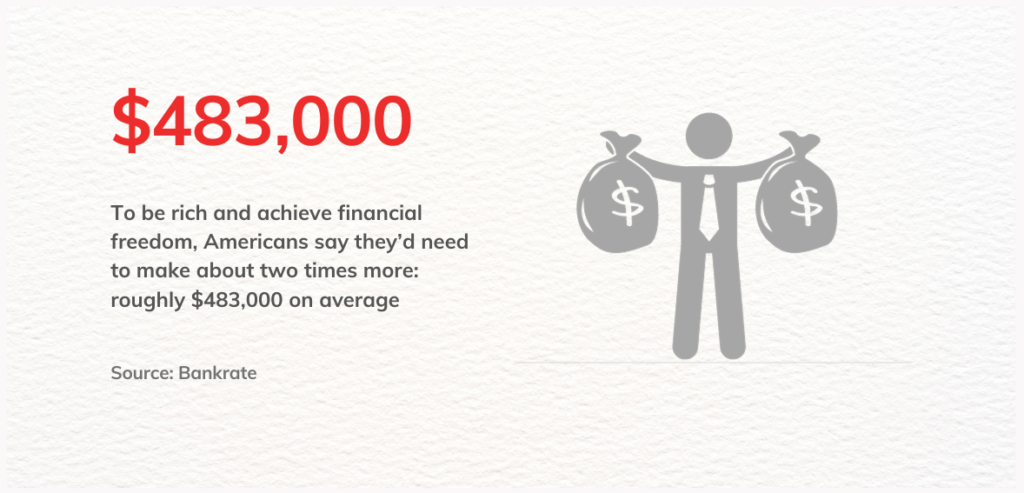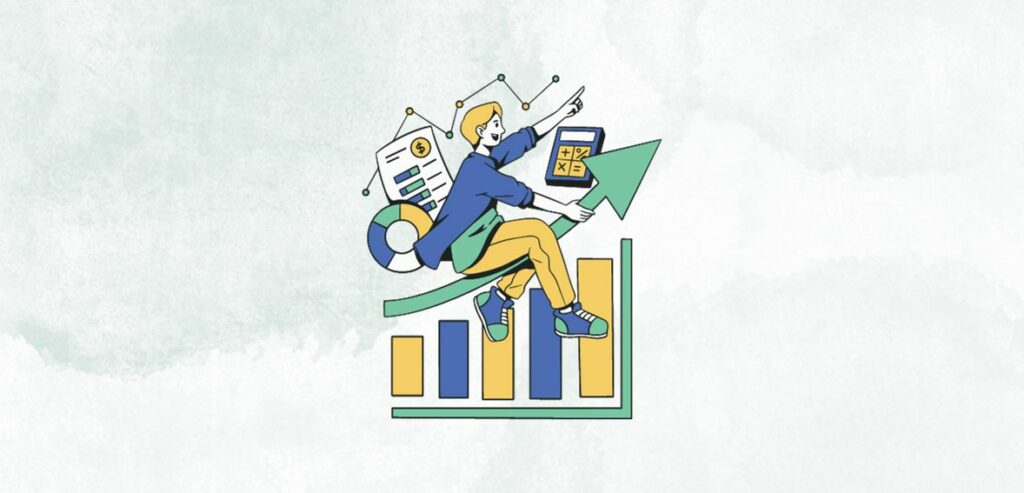The words financial freedom and financial independence sound similar. Often, these terms are used interchangeably and most of the time people don’t even know these basic terms of finance because they have no interest in finance. Even 46% of Gen Z who are confident about their financial knowledge consider them as same. But is there any difference between financial freedom and financial independence? Let us understand today.
While working hard for financial independence is a great objective for anyone, it is crucial to recognize the significance of cultivating a mindset of financial freedom. Attaining financial freedom and enjoying its associated benefits can occur well before reaching the numerical goals of financial independence. Financial freedom is more or less a mindset and financial independence is the result of that mindset. Let us understand the difference between financial freedom vs financial independence based
What Do You Mean By Financial Freedom?
Contrary to a mere numerical benchmark, financial freedom is a mindset that transcends the dictates of money. It’s a state where your decisions are steered by passions and values rather than mere monetary considerations. True financial freedom entails having sufficient income and savings to cover living expenses, not necessarily amassing vast wealth but ensuring enough to liberate time for pursuits you cherish, unburdened by the need to solely earn money.
This state of liberation is attainable with a bit of financial planning. Being financially responsible is the most important step to begin with. A recent poll by Bankrate gives a viewpoint of Americans that they only need 2x of their Annual salary (or $480,000) to be considered Financially well or “Rich.”

The basics of financial freedom contains:
- Securing a steady income and feeling in control of financial matters.
- Progressing towards financial goals systematically.
- Maintaining a financial safety net for unforeseen circumstances.
- Possessing adequate funds to sustain a desired lifestyle.
Actual financial freedom can be attained through the creation long-lasting wealth. It empowers individuals with the liberty to pursue their desires. The common thread is the freedom and capability to do whatever one wishes. A goal within reach through a strong and in-depth financial planning.
How Can You Achieve Financial Freedom?

Yes, anybody can achieve financial freedom. To attain financial freedom, focus on these three crucial steps:
- Stay Away From Debt
The foremost obstacle to financial freedom is debt, especially high-interest credit card debt ranging from 30 to 40% annually. Prioritize becoming debt-free person by refraining from using credit cards and implementing a strategic debt repayment plan before getting into investments.
When you come across a substantial sum, such as a bonus, consider allocating it towards loan repayment. This approach can be integrated into a comprehensive financial plan to expedite the journey toward financial freedom.
- Start Early
The age-old advice remains relevant even today: commence your investments early, even if it’s with modest amounts, and witness the transformative power of compounding. Adopting a goal-based approach further enhances your financial journey, allowing you to allocate the right amounts to each investment while crafting your monthly budget. This strategic approach not only minimizes financial stress but also saves considerable money in the long run.
- Be Prepared
Unforeseen expenses can potentially derail your path to financial freedom. To counter this, proactive measures are essential:
Build a Contingency Fund: Set aside three to six months’ worth of expenses as a contingency fund to address urgent or unforeseen financial needs. This fund acts as a financial buffer, ensuring you won’t need to tap into your investments during emergencies.
Obtain Medical Insurance: Given the escalating costs of healthcare, lacking health insurance can jeopardize your pursuit of financial freedom. A single medical emergency could set your financial goals back by years. To safeguard your investments from being depleted by medical bills, investing in health insurance is paramount.
What Do You Mean By Financial Independence?
In broad terms, attaining financial independence signifies having sufficient investments, passive income, and assets to cover your expenses. It ensures that, if you maintain your current lifestyle, there’s a reasonable expectation of never running out of money without the necessity to work. This state empowers you to dictate how you spend your time, whether it’s pursuing your traveling life, following your passions, making donations, volunteering, or any other endeavor you choose.

While various equations exist to determine financial independence, it’s fundamentally a mathematical calculation, often pegged at 25x your annual expenses. This milestone is reached when you achieve a specific net worth. For many individuals, this constitutes a substantial goal, possibly involving the accumulation of a million dollars or more. Achieving it may be a prospect that lies years or even decades in the future.
How Can You Achieve Financial Independence?
Attaining financial independence requires a proactive approach to financial management. Building multiple income streams is key to enhancing stability and resilience, reducing reliance on a single source of income. This diversification can be achieved through avenues like investing in rental properties, starting a side business, or generating passive income through stock dividends.
Integral components of financial independence include reducing debt and increasing savings. Paying off high-interest debts and maintaining disciplined spending habits liberate resources for investment and wealth growth. Establishing an emergency fund is equally crucial, serving as a safety net during unforeseen circumstances.
Wise investing plays a pivotal role in the journey to financial independence. Diversifying an investment portfolio helps minimize risks and maximize returns. Thorough research, seeking professional advice, and staying informed about market trends empower individuals to make informed investment decisions. Adopting these strategies fosters a comprehensive approach to achieving financial independence.
Financial Freedom Vs Financial Independence: Key Differences
While financial freedom and financial independence share some similarities, it’s important that you understand the thin line that sets them apart. Financial independence primarily revolves around achieving a level of financial stability, enabling one to cover living expenses without relying on traditional employment. In contrast, financial freedom centers on the ability to make choices in alignment with personal values and aspirations, free from financial constraints.
Moreover, the mindset and goals associated with each concept diverge. Financial independence typically involves a strong focus on saving, investing, and establishing passive income streams. On the other hand financial freedom involves aligning financial decisions with personal values, shaping a meaningful life, and pursuing passions that go beyond financial considerations. Understanding these distinctions is crucial for a well-rounded approach to financial planning.
Financial freedom and independence hold distinct meanings. Let’s explore each concept.
Financial Freedom:
- Involves having enough passive income to cover living expenses.
- Provides the option to work or run a business if desired.Grants freedom to choose one’s lifestyle and time allocation.
- This may necessitate active management of investments and income streams.
Financial Independence:
- Entails accumulating sufficient assets and investments for perpetual lifestyle support.
- Eliminates the need to work for financial sustenance.Offers complete freedom to dictate how time is spent.
- Empowers the ability to leave a legacy or make a substantial impact with accumulated wealth.
- While work or business remains an option, it is not essential for financial security.
In essence, both financial freedom and financial independence hinge on having ample passive income to cover living expenses. Financial freedom allows the choice to work, while financial independence signifies absolute freedom from the necessity to work for financial means.
What Is Financial Security? Is This Any Different?
Financial security is not just about the numbers; it’s a state of mind intricately linked to your financial well-being. It embodies the mental tranquility and confidence derived from the assurance that the needs of both your future and your family’s future are adequately addressed. The significance of financial security lies in the challenging nature of financial insecurity.
In essence, attaining financial security goes beyond the mere accumulation of wealth; it is about fostering a sense of mental peace and confidence, safeguarding against the difficulties posed by financial uncertainty.
While financial security, financial independence, and financial freedom may appear similar at first glance, they encapsulate distinct concepts in the realm of personal finance.
What Is The Pathway To Financial Freedom?

Achieving financial freedom and independence is always within your hand’s reach, but it demands discipline, dedication, and implementation. To start on this journey, you must take charge of your finances and make informed decisions regarding your earnings, savings, and expenditures. Here are actionable steps to guide you on the path to financial independence and freedom:
Calculate Your FI Number and Net Worth
Determine your Financial Independence number by assessing the money required to generate sufficient passive income covering living expenses and desired lifestyle. Multiply your expected annual expenses by 25 for a quick calculation.
Understand your net worth by subtracting liabilities from assets. Add up the value of assets like savings, investments, and property, and subtract debts to unveil your net worth. This knowledge is vital for your journey toward financial freedom.
Establishing a Budget and Maintaining Frugality
Initiating a budget is the most important thing. It helps you to allocate your resources in the right way and monitor the output. To create an effective budget, outline your income, fixed expenses, and variable expenses, ensuring a strategic distribution of funds. Don’t forget to earmark a portion of your income for savings and investment goals. Various approaches to budgeting exist, so choose one aligned with your lifestyle and savings objectives. The key is not just to create a budget but to adhere to it consistently.
Living beneath your means is a powerful strategy to spend less than you earn, allowing you to prioritize saving and investing. To genuinely embrace this lifestyle, steer clear of lifestyle inflation, trim unnecessary expenses, and accord precedence to your financial objectives. The essence lies in not just creating a budget but in steadfastly adhering to it for sustained financial well-being.
Balance Debt and Maintain Clarity in Your Goals
Eliminating debt is a crucial step toward attaining financial freedom and independence. Debt can act as a hindrance, impeding your progress and hindering the realization of your financial aspirations.
To be a debt-free individual, prioritize settling your loans by considering their interest rates, making payments beyond the minimum requirement, and contemplating debt consolidation or refinancing options.
Setting clear financial goals is instrumental in keeping yourself focused, motivated, and accountable. Identify both short-term and long-term objectives, such as saving for retirement, homeownership, or investment, to establish a roadmap for your financial journey. In essence, the combination of debt elimination and goal clarity propels you toward a more secure financial future.
Be Financially Resilient and Explore Investment Avenues
Creating an emergency fund serves as a financial safety net, enabling you to navigate unexpected expenses or income disruptions with ease. To initiate this fund, allocate three to six months’ worth of living costs into a dedicated savings account. It is essential to periodically replenish the fund if you find the need to withdraw funds for unforeseen circumstances.
Simultaneously, engaging in strategic investments can contribute to building generational wealth and fostering a passive income stream to sustain your living expenses and chosen lifestyle. To start on your investment journey, write down clear investment goals, assess your risk tolerance, and determine your investment horizon. Subsequently, select suitable investment instruments, ranging from stocks and bonds to mutual funds or real estate, aligning them with your identified financial objectives.
Best Avenues To Start On Your Financial Freedom Journey
Different methods exist to easily double your investments over time to have a financially secure and free future. Here are the top 3 avenues that you can look up to:
Start Your 401 (k)
One of the simplest and least risky methods to multiply your wealth and progress steadily toward financial freedom is by capitalizing on an employer match within a 401(k) account. Seize this opportunity and utilize the plan’s tax advantages to amplify your retirement savings.
Employers frequently offer monetary incentives for employees who contribute to their own retirement accounts. This approach is useful, low-risk and accumulate a separate sum for your future.
Invest in the S&P 500
Opting for an index fund tied to the S&P 500 index presents a compelling avenue to potentially double your investments. While it carries more risk compared to bonds and bank CDs, it stands as a less risky alternative than investing in individual stocks. The S&P 500 comprises approximately 500 of the largest and most prosperous US companies, making it a robust choice for those looking at long-term investment strategies.
Moreover, this fund boasts an appealing long-term return, averaging around 10% yearly over extended periods. This implies that, on average, you might witness your investment doubling in just over seven years. Additionally, the S&P 500 may experience extended periods of losses.
Try Your Hand in Real Estate
Contrary to its reputation for gradual appreciation, real estate holds the potential for rapid financial growth, especially when considering the dynamics of mortgage transactions. The key lies in leveraging, particularly through a mortgage, which can facilitate a substantial increase in your investment.
As an example let us envision acquiring a $150,000 home with a standard 20% down payment, totaling $30,000 (excluding closing costs). The remarkable aspect is that a mere 10% appreciation in the home’s value—rising to $180,000—transforms your initial $30,000 investment into a total gain of 50%, comprising the original down payment and a $15,000 capital gain. This exemplifies the potent impact of leveraging in real estate transactions.
Conclusion
For a robust financial journey you should know the difference between financial freedom and financial independence. While financial independence involves achieving numerical benchmarks, financial freedom is a state of mind that transcends monetary considerations.
It’s essential to recognize that financial security is intricately linked to mental peace and confidence, safeguarding against the challenges of financial uncertainty. By embracing a dual approach of cultivating a mindset of financial freedom and working towards numerical goals of financial independence, individuals can enrich their financial experience and tailor a path that aligns with their values and aspirations.
Frequently Asked Questions
What is the distinction between financial independence and freedom?
Financial freedom involves living without financial constraints, enabling you to lead the life you desire. On the other hand, financial independence revolves around generating sufficient passive income to cover living expenses without the necessity of active work.
How can I achieve financial independence at 18?
– Work alongside your studies.
– Avoid non-essential things.
– Grow your Emergency Fund.
– Utilize modern banking services and techniques for added features.What are indicators of financial freedom?
Common signs of financial stability involves having minimal to no debt, the ability to adhere to a budget, maintaining a healthy savings balance, and possessing a favorable credit score. Individuals with financial stability often witness a progressive increase in their net worth annually.
What are the 5 pillars of financial freedom?
Achieving financial freedom requires time, effort, and a well-crafted financial plan. Focus on five essential pillars to build wealth: saving, budgeting, debt repayment, investing, and insurance. Each pillar plays a crucial role in establishing a solid foundation for financial independence.

